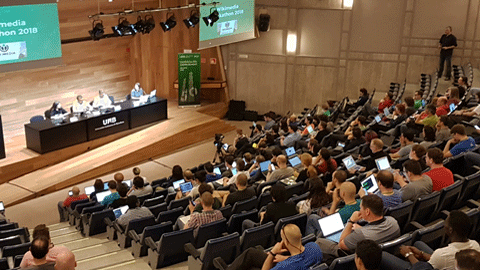Success at the Wikimedia Hackathon with a total of 84 new projects

21/05/2018
Some of these projects consist in creating a virtual keyboard for the Fon language spoken in Benin and a prototype to be able to translate articles on mobile devices. Multilingualism was also one of the pillars of this edition organised by Amical Wikimedia, with the support of the UAB Wikimedia Foundation. Among the other projects were several improvements in the system known as ORES for the detection of vandalism in Wikipedia, a new game to improve the Wikidata database and new cloud storage space for developers.
For the first time in the history of this type of an event, the help of large companies was rejected in order to have the event organised by a team of volunteers. Inspired by this, one fourth of the people attending also offered to help in volunteering tasks. By doing so, the Amical Wikimedia Foundation sought to be coherent with the values upheld by projects such as Wikipedia, edited freely by anyone interested in contributing to the project, and the rest of events organised by this foundation, as Rachel Ferrand, Director of Events of the Wikimedia Foundation, acknowledged at the closing ceremony.
Another aspect of the wiki movement was an interest in fostering diversity. In this sense, its grants policy has helped 20% of attendants to be women, double the amount of women normally seen in these sectors. Efforts were made to make each of the attendants feel at home by taking into account any special nutritional needs and those celebrating Ramadan. Developers attending with their children, those with reduced mobility or other special needs were also catered to with the aim of making their stay and participation in the event a pleasant one. The event was also made sustainable by including biodegradable tableware and by delivering any additional food left over from the event to social centres.
The Wikimedia Hackathon took place from 18 to 20 May at the UAB School of Engineering. This important event brought together developers from around the world aiming to improve the technological infrastructure of Wikipedia and other sister projects. This is the first time that a Wikimedia Hackathon was held in a city of Southern Europe.
Participants from 48 countries
The almost 300 participants of the Wikimedia Hackathon came from 48 different countries. Throughout the event, different projects were presented focusing on databases, mobile phone editing, digital humanities, design, automatic translation and visual collaboration. The ORES project was also presented, which is a machine learning system recently adapted to the Catalan version of Wikipedia which helps fight against digital vandalism. It works with a prediction model based on previous acts of vandalism.
The next edition of the Wikimedia Hackathon will take place in Prague, capital of the Czech Republic, where the same spirit is expected to be maintained and give continuity to the technical projects begun this year, with the alliances created among developers from different countries leading to long-term collaborations. These hackathons attract developers from several different countries who present new tools and work jointly to improve Wikimedia's projects. Previous editions have been held in Berlin (2011 and 2012), Amsterdam (2013), Zurich (2014), Lyon (2015) and Jerusalem (2016). In the 2017 edition alone, held in Vienna, over 250 participants attended from around the world. The event coincided with the fifth anniversary of the Amical Wikimedia association, officially recognised in 2013 by the Wikimedia Foundation.
More information:
Wikimedia Hackathon 2018